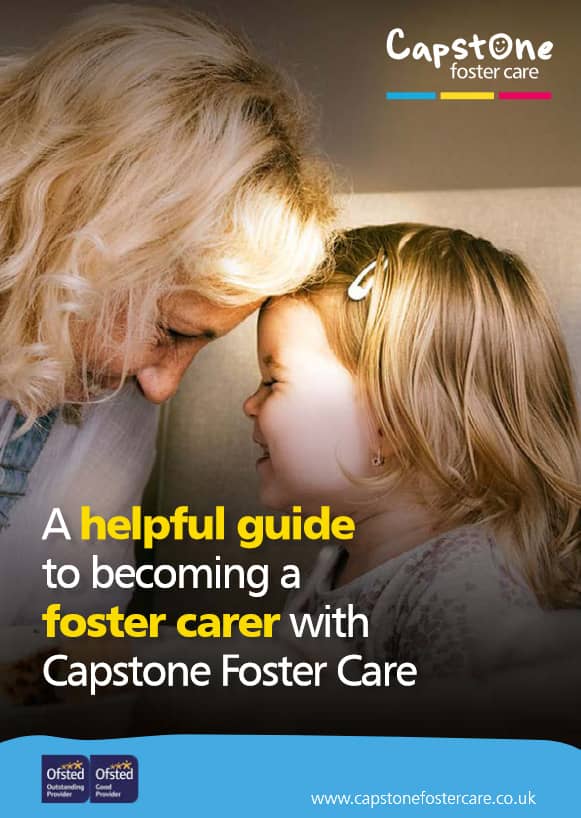


Fostering a disabled child
The role of an independent fostering agency
How to choose a foster care agency
Can I choose who I foster?
What are the benefits of fostering with an independent fostering agency?
What happens when a child is taken into care?
Fostering process: what happens on an initial home visit?
Fostering with local authority vs independent agency
A complete guide to becoming a foster carer
How Are Children in Foster Care Matched with Carers?
Foster Care Budgeting Tips
Becoming A Foster Carer
What is a Care Leaver?
What is a Foster Carer?
Fostering Regulations
How long does it take to become a Foster Carer?
What are the Foster Care requirements?
Changing IFA - Transferring to Capstone
8 reasons why a child may be taken into care
Fostering as a Career
Can you foster if you smoke or vape?
A guide to fostering assessments
LGBTQ+ Fostering
Equality, Inclusion & Anti-discriminatory Practice in Foster Care
What can disqualify you from foster care?
Can you foster if you’re on benefits?
Top transferable job skills to become a foster carer
Fostering as a same sex couple
Fostering while renting
Can you foster if you have mental health issues?
Is there an age limit for fostering in the UK?
Do foster carers get a pension?
How to foster a child: A step by step guide
How do DBS Checks Work?
Can I foster if...?
Mythbusting the top 10 Foster Care Myths
Can I foster if I am disabled?
LGBT Fostering Mythbusting
Can I foster if I have pets?
Can I Foster A Child?
Can I Foster and Work?
Can you Foster with a Criminal Record
Can Single People Foster?
LGBT Family and Foster Care
Fostering across Cultures
Muslim Fostering
Christian Foster Care
Sikh Fostering
Empty Nest Syndrome and Foster Care
Can I Foster?
What is the difference between residential care and foster care?
Fostering Babies and Young Children
What is Kinship Care?
Fostering Babies - Myths
Focusing on Parent & Child Fostering
Fostering Siblings
Fostering Teenagers
Fostering Teenagers - Breaking down the Myths
Fostering Unaccompanied and Asylum Seeking Children
Mother and Baby Foster Placements
Private Fostering
How does therapeutic fostering work?
Young Children Fostering Placements
Difference between short and long-term fostering
Types of self-harm
A Guide to the Foster Care Handbook
Reunification and Birth Parents: A Guide for Foster Carers
What is an EHC Plan? A Guide for Foster Carers
How to prepare a child for becoming a care leaver
Children who foster: impact of fostering on birth children
Fostering LGBTQ+ Youth
How to prepare your home for a foster child
How to help a lonely child: A Guide for Foster Carers
What are the National Minimum Standards for Fostering Services?
10 tips for foster children's education
How to prepare your foster child for secondary school
Tips for coping when foster placements end
Tips for foster parents during Coronavirus
What happens if foster parents get divorced?
5 ways to manage Mother's Day with foster children
Tips for managing foster children's bedtime routines
How to handle foster child bullying
Fostering allowances and the gender pay gap
What discounts can foster carers get?
How to adopt from Foster Care
5 ways to manage Father's Day for children in foster care
8 most common fostering challenges
FosterTalk Membership with Capstone Foster Care
Supporting foster children's contact with birth families
A guide to independent fostering
Keeping Children Safe Online: A Guide For Foster Carers
Movies About Foster Care
Play-based learning strategies for foster carers
A Guide to the Staying Put Program
Why Foster Parent Wellbeing Matters
How to deal with empty nest syndrome
How to recognise signs of depression in foster children
Can you take a foster child on holiday?
Tips and advice on fostering with a disability
10 tips on connecting with your Foster Child
Fostering vs Adoption - What's the difference?
How Fostering can change a future
How to adopt from Foster Care
How to encourage children to read in Foster Care
How to prepare a Foster Child's bedroom
Reading and Storytelling with Babies and Young Children
Supporting Children's Learning
The 20 most recommended books Foster Carers and young people should read
Things you can do when your children leave home
The impact of early childhood traumas on adolescence and adulthood
Anxious Disorders in Foster Children
What is sexual abuse and sexual violence
Foster Child behaviour management strategies
Foster Parent Advice: What to expect in your first year of fostering
Capstone's twelve tips at Christmas
10 celebrities who grew up in Foster Care
Could Millenials be the solution to the Foster Care crisis?
Do you work in Emergency Services?
Form F Assessor and Assessment Training
Foster Care Fortnight
Improving Children's Welfare - Celebrating Universal Children's Day
New Year - New Career - Become a Foster Carer
Young People Charities
One of the most common questions we receive from prospective foster carers is, "can I work and foster?". The short answer is yes, you can foster and work another job. Although, flexibility is important as some types of foster care require more of your time than others, and your priority as a foster parent should always be supporting to the child in your care.
Throughout this guide, we will cover everything you need to know about fostering and working full-time. Whether you’re a single foster carer or a fostering family, our team at Capstone Foster Care is here to help you transform lives.
Yes, you can work full-time and be a foster carer. In the UK, full-time employment often involves working 35+ hours per week. Recent flexible working legislation has made it simpler to request arrangements that suit you and your fostering capabilities:
This means that if you can schedule your hours around caring for your foster child, whether that means working from home or working during hours that they would be at school, it’s absolutely possible to maintain a full-time job whilst fostering.
However, it’s important to note that fostering is considered a full-time career in itself. After all, the children you foster deserve a lot of time, affection and care. Because of this, you will need to demonstrate a flexible work schedule that allows you to be present with your foster child whenever they’re in the family home.
As each foster placement is different, we’re committed to making your fostering experience as positive, rewarding and enlightening as possible by taking your individual circumstances into consideration.
As a foster carer, your primary role is to provide a safe, secure and supportive environment for a child in need. That goes beyond creating a loving home. It means meeting their needs, no matter the day or time. So, if you are considering balancing full-time work alongside foster care, you must also fulfil the following responsibilities:
Support your foster child or children with their daily routine, providing healthy meals, clean clothes and promoting their overall health and wellbeing.
Take your foster child to school, follow their education closely and help them with homework when needed.
As part of maintaining their daily routine, you will also be responsibile for taking you foster child to their extracurricular activities and health-related appointments.
Attend regular meetings with social workers and other members of the child's support network. You will also have the opportunity to attend meetings with fellow foster carers in your reigon.
Immerse yourself in regular training and development, with the option to attend specialist courses in addition to your mandatory training.
Arrange meetings and contact with their family, supporting reunification where appropriate.
Nurture their development, teach them important life skills, and create fun and lasting memories together.
Yes, you can foster and work part-time. Part-time employment instantly offers foster carers far more flexibility than a full-time role. Freelancing and consultancy work is also popular for those looking to continue their existing career and generate some additional household income while transforming the life of a child. Again, there are no rules or prejudices against working whilst fostering, but your commitment to your foster child should always take priority, so it’s important that prospective carers (and employers) understand this.
If you are a foster couple, you will have greater flexibility over your careers than you would as a single foster parent. Whilst a single foster carer must always be available to tend to their foster child’s needs, as a couple, you can work together to distribute your time between fostering and working. For example, one parent may choose to stay at home as the primary foster carer whilst the other continues to work full-time, making them the secondary carer.
However, whilst fostering as a couple can make maintaining a second career more realistic, it’s also worth noting that fostering itself is a full-time job that comes with a generous fostering allowance to both fund the child in your care and renumerate you for your time, support and experience. Therefore, it may be worth evaluating both of your commitments to fostering and assessing how best to approach work. It’s crucial that you and your partner are transparent with each other and aligned with your fostering goals.
For a single man or woman, fostering and working full time may become more of a challenge. Balancing the responsibility of providing a nurturing home, single foster parents must also be available for meetings with foster agency social workers, teachers, and other personnel involved in protecting and maintaining the child’s well-being.
However, it is possible for single foster parents to work during school hours, depending on the age of their foster children. Flexibility is essential, so it’s important that if you are a single person and would love to foster, you must discuss flexible working arrangements with your employer. Your commitment is the key to encouraging a foster child to flourish.
Yes, fostering is a full-time career. When you become a foster carer, your first responsibility is to the child in care, which is a 24/7 job. However, you may not always have a foster placement. That’s why it’s crucial to understand that whilst fostering is a vocation from a financial perspective, payments are reliant on whether you have a placement, which is subject to demand and suitability. So, unlike a contracted full-time job, an income solely from fostering is not guaranteed.
Whilst you can’t apply to be a part-time foster parent, you can become a respite foster carer. Respite placements, otherwise known as short breaks, are short-term arrangements that allow foster parents to take a break whilst their foster child can gain new experiences and meet new people under the safe care of another foster parent.
Respite stays can span from as little as two days to two weeks, and are always arranged in advance, so you can adjust your schedule when your fostering services are required.
Many foster carers see respite care as a fantastic introduction to fostering, allowing them to balance their current jobs whilst still supporting children in need.
Yes, like any other job, you will receive payment for your time, skills and experience. However, unlike traditional employment, you won’t receive a fixed salary paid in monthly instalments. Instead, we pay you a weekly fostering allowance to ensure that both you and your foster child can live comfortably. Your allowance accounts for:
These fostering allowances also do not impact other benefits you may receive, such as housing benefit or working tax credits. Learn More About Foster Pay
Yes, each foster carer requires training before fostering. Whilst you don’t need any prior experience to become a foster parent, all our carers have mandatory training before being paired with their first foster child. Even families with their own children may see a notable difference in the needs of their foster child. This is why it’s essential that our carers immerse themselves in training and development courses to provide the best support for the foster child in their care.
At Capstone Foster Care, we offer additional training beyond our essential ‘Skills to Foster’ course to ensure our carers always feel equipped with the tools to support their foster children. We’re also available 24/7, so should you ever need us, we’re on hand to offer our help and guidance.
Looking for more information on fostering and working full-time? Contact Capstone Foster Care today or call us on 0800 012 4004 – we’re here to help answer all of your fostering and working queries.
With Qualifying Care Relief, most foster parents are exempt from paying tax on their fostering allowance. If so, you will not pay any additional tax, as your salaried income will be managed and taxed independently from your fostering pay.
Yes, you are still eligible to receive benefits as a foster carer. Benefits you could be entitled to include:
At Capstone Foster Care, there is no hierarchy amongst our foster carers. However, that doesn’t mean you can’t receive pay rises or further develop your skills.
We regularly review our fostering allowances and have granted five pay increases to our carers over the past two years. Similarly, if you decide to specialise in therapeutic foster care or parent and child fostering, you will be able to expand your knowledge and skillset, allowing you to facilitate specialist arrangements with higher weekly allowances.
Yes, all our foster parents are granted 14-night respite allowance to be taken together or separately. At Capstone, we understand the importance of taking time to refill your own cup, so you can be your best self for your foster children.
Unlike most salaried roles, foster carers are eligible for a generous tax scheme called Qualifying Care Relief. As a result, foster carers pay little to no tax for their fostering placements.
To find out more regarding fostering allowance and tax rules, read our guide ‘How much do Foster Parents get Paid?’
If you’ve got any questions or would like to find out more about fostering with Capstone, fill out the form below.
An experienced fostering advisor from your local area will then be in touch.

Start the conversation today. Our team of friendly advisors are on hand to answer any foster care questions you may have. We can offer you honest and practical advice that can help you decide if becoming a foster carer is the right path for you.


